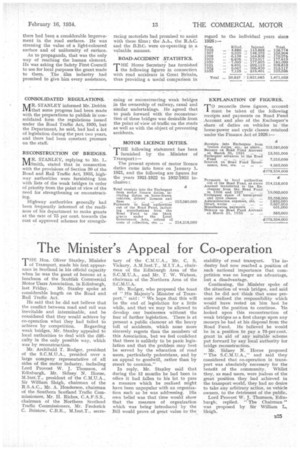The Minister's Appeal for Co-operation
Page 35

If you've noticed an error in this article please click here to report it so we can fix it.
T"EHon. Oliver Stanley, Minister of Transport, made his first appearance in Scotland in his official capacity when he was the guest of honour at a luncheon of the Scottish Commercial Motor Users Association, in Edinburgh,
last Friday. Mr. Stanley spoke at considerable length on the Road and Rail Traffic Act.
He said that he did not believe that the conflict between road and rail was inevitable and interminable, and he considered that they would achieve by co-operation what they had failed to
achieve by competition. Regarding weak bridges, Mr. Stanley appealed to local authorities to deal with the difficulty in the only possible way, which was by reconstruction.
Mr. Archibald T. Rodger, president of the S.C.M.U.A., presided over a large company representative of all sides of the motor industry, including Lord Provost W. J. Thomson, of Edinburgh, Mr. Sidney N. Horne, M.Inst.T., president of the C.M.U..A., Sir William Sleigh, chairman of the R.S.A.C., Mr. A. Henderson, chairman of the Southern Scotland Traffic Commissioners, Mr. H. Riches, C.A.F,S.S., chairman of the Northern Scotland Traffic Commissioners, Mr. Frederick C. Bristow, C.B.E., M.Inst.T,, secre
tary of the C.M.U.A., Mr. C. S. Vickary, A .M.Inst.T. , M. .T A . , chairman of the Edinburgh Area of the S.C.M.U.A., and Mr. T. W. Watson, chairman of the Northern Area of the S.C.M.U.A.
Mr. Rodger, who proposed the toast of " His Majesty's Minister of Transport," said: " We hope that this will be the end of legislation for a little while, and that we may be allowed to develop our businesses without the fear of further legislation. There is at present a public clamour at the heavy toll of accidents, which none more sincerely regrets than the members of this Association, but we feel confident that there is unlikely to be panic legislation and that the problem may best be served by the education of road users, particularly pedestrians, and by an appeal to goodwill, rather than by resort to coercion."
In reply, Mr. Stanley said that during the 12 months he had been in office it had fallen to his lot to pass a measure which he realized might have been unpopular with an organization such as he was addressing. His own belief was that time would show that the measure of organization which was being introduced by the Bill would prove of great value to. the
stability of road transport. The in dustry had now reached a position of such national importance that competition was no longer an advantage, but a disadvantage.
Continuing, the Minister spoke of the situation of weak bridges, and said that he did not think that some persons realized the responsibility which would have rested on him had he allowed the position to continue. 'He looked upon this reconstruction of weak bridges as a first charge upon any moneys he had at his disposal from the Road Fund. He believed he would be in a position to pay a 75-per-cent, grant in aid of any suitable scheme put forward by any local authority for bridge reconstruction.
Mr. Sidney N. Horne proposed " The S.C.M.U.A.," and said they considered that co-operation in transport was absolutely necessary for the benefit of the community. Whilst they, as road users, were jealous of the great position they had achieved in the transport world, they had no desire to take any arbitrary action, as vehicle owners, to the detriment of the public.
Lord Provost W. J. Thomson., Edinburgh, replied. "The Chairman" was proposed by Sir William L. Sleigh.




















































































